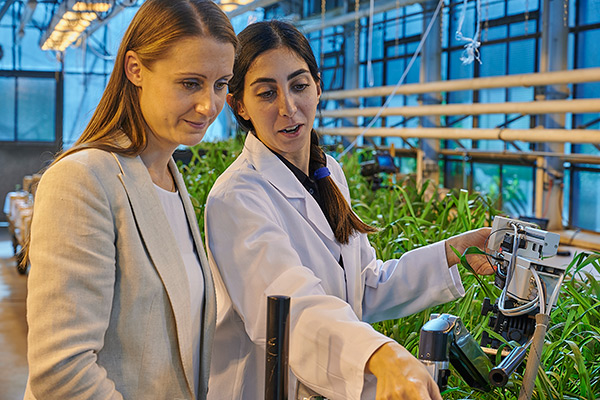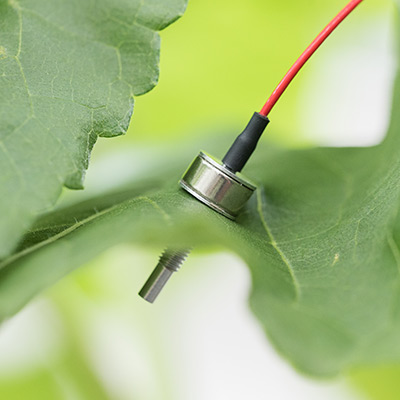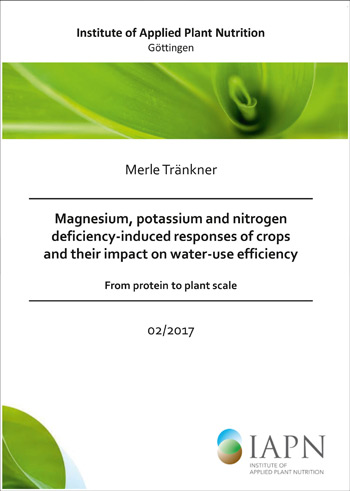Research
Magnesium, Potassium and Nitrogen Deficiency-Induced Responses of Crops and Their Impact on Water-Use Efficiency
Limitation of water is a worldwide constraint to crop production and thus improvements of water-use efficiency (WUE) are targeted by science and industry. Beside breeding efforts, plant nutrition management is an influential variable on WUE and different supply levels of plant nutrients can affect WUE. In this context, the Ph.D. project of Junior Professor Dr. Merle Tränkner aimed at investigating the plant physiological reactions to magnesium (Mg) deficiency in barley and nitrogen (N) deficiency in tobacco and the relation between WUE considering different levels of the plant, i.e., leaf-WUE (defined as the ratio between net CO2 assimilation and stomatal conductance) and biomass-WUE (defined as plant dry matter production per unit of water loss via transpiration).
Experimental work on investigating water-use efficiency
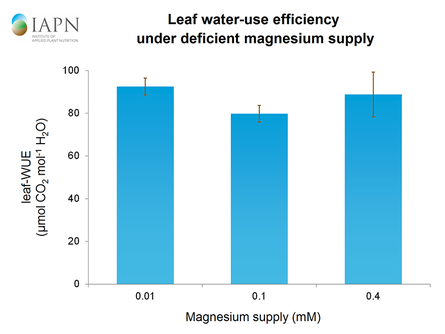
Leaf water-use efficiency under deficient magnesium supply. (Source: Tränkner)
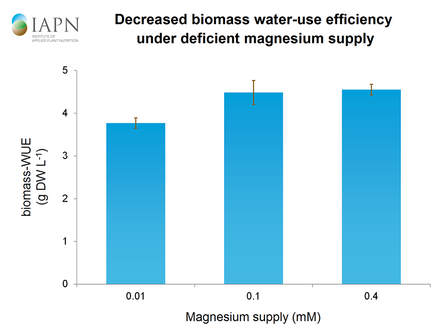
Decreased biomass water-use efficiency under deficient magnesium supply. (Source: Tränkner)
In numerous experiments in which plants were cultivated in the greenhouse, parameters such as leaf gas exchange, whole plant transpiration and biomass production were measured and leaf-WUE and biomass-WUE calculated. The obtained results indicate a highly nutrient specific response of WUE as Mg deficiency slightly increased leaf-WUE, but decreased biomass-WUE and contrastingly, N deficiency decreased leaf-WUE, but did not affect biomass-WUE.
Research on plant physiology and carbon partitioning influenced by magnesium fertilization
Beside these studies, Merle Tränkner analyzed the impact of Mg deficiency on the level of oxidative stress in barley plants. Oxidative stress is characterized by the formation of reactive oxygen species, such as hydrogen peroxide, and enhanced antioxidant enzyme activity which were measured by intense laboratory studies. Mg deficiency remarkably increased the formation of ROS, although the activities of ROS antioxidant enzymes were highest. From this work, it can be concluded that severe Mg deficiency exhausts the capacity of the antioxidative machinery to detoxify ROS and leads to severe oxidative stress in the plants.
It is well known that biomass production is reduced under Mg deficiency in numerous crops and that Mg deficiency negatively impact the translocation of assimilates (i.e., sugars) from leaves having a high rate of photosynthesis to young growing organs of the plant, but it is still under debate whether accumulation of sugars is the result of defective export from source leaves or limited carbohydrate use in sink leaves. Thus, a Ph.D. project of Merle Tränkner investigated whether the inhibition of carbohydrate allocation under Mg deficiency originates from source leaves or from the sink tissues in sugar beet. A research cooperation of IAPN and the Section of Plant Nutrition at the University of Giessen, headed by Professor Dr. Sven Schubert, was established at the end of 2014 and Merle Tränkner stayed for one and a half years as a guest PhD student in this working group to conduct the respective experiments and analyses.
Research on proteomic alterations under conditions of water-deficit and potassium deficiency
In a further Ph.D. project, Merle Tränkner studied the proteomic alterations under conditions of water-deficit and potassium (K) deficiency in roots of wheat to enhance the understanding of plant responses to drought and K deficiency. In this respect, she established the proteomic system in the laboratory of IAPN which allowed analyzing precisely the proteins after their extraction from wheat roots. The results showed that K deficiency and drought lead to changes in the expression of proteins which are involved in general stress defense mechanisms. These studies were done in cooperation with Professor Dr. Christian Zörb, head of the section of Quality of Plant Products at the University of Hohenheim.




